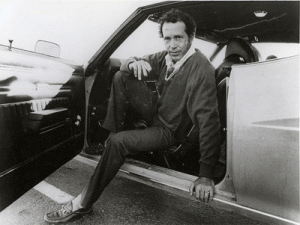 “Because there was once a god who roamed the earth named Warren Oates.” –Richard Linklater, on one of the sixteen reasons he loves Two-Lane Blacktop
“Because there was once a god who roamed the earth named Warren Oates.” –Richard Linklater, on one of the sixteen reasons he loves Two-Lane Blacktop
Rumor has it that there’s a documentary out there about Warren Oates, something that might sum up the man from Depoy, Kentucky. I doubt it… I mean, really, how do you sum this guy up? In fact, he should’ve been ridiculous, the way that Elisha Cook Jr.–a great character actor by any standard–often was portrayed.
Look at Oates in my favorite role of his, as G.T.O. in Two-Lane Blacktop. The screenplay, a ridiculous thing that could have resulted in a pretentious three-hour affair, has G.T.O. as some sort of blond-haired former frat boy. Someone got the bright idea to put Oates behind the wheel of the yellow Goat instead, change the frat boy to some former military scrub just trying to get by in this world. There he is, clad in a polyester v-neck sweater that changed colors daily, knuckle-less driving gloves and loafers, smiling that big grin of his and telling a different life story to every hitchhiker who sat in the passenger seat.
Oates’ character was lost, man, lost in the wilderness of the highway, and he looked as if he fit into every lie he told: a former Korean vet who just couldn’t stick with the same high forever. A television producer who left his wife and family in the maelstrom of a mid-life crisis. A reckless and lucky gambler who won the G.T.O in Vegas. A man who lived half his life under a car, won other vehicles, and could build an engine from nothing but parts. “Those satisfactions are permament,” Oates’ G.T.O tells us. Indeed.
Character actor and leading man. That was Warren Oates. A Kentucky boy and a U.S. Marine. He made a lot of movies in his fifty-three years of living (over a hundred if you include television work), for some very notable directors. For Peckinpah there’s Ride the High Country, The Wild Bunch, and Bring Me the Head of Alfredo Garcia (though old Sam supposedly fucked Warren over for the lead of The Ballad of Cable Hogue, a great movie that would have been regarded as a classic with him instead of Jason Robards, who isn’t quite weird enough); for Monte Hellman in The Shooting, Cockfighter, and the masterpiece Two-Lane Blacktop (all three are great and make up the only things worth seeing of Hellman’s).
Fans of Stripes love his Sgt. Hulka, and he did some work in Spielberg’s 1941. You can see him starring in any number of intriguing movies that really aren’t worth much (or don’t sound like they’re worth much): The Hired Hand, The Brink’s Job, Chandler, The Border, Dixie Dynamite, and many more.
Balding, diminutive, with a wide grin that made him look anything but sophisticated, though he also never really looked genuinely threatening (thankfully keeping him from playing bad guys forever.) But he did look like a man who’d seen a lot, felt a great deal more, and then, depending on who you were and where you had met him, would tell you one story or perhaps another, the truth or an outright lie. Good Lord, I’d love to see this crazy man in his one episode of TV’s “Lost in Space”–imagine a youthful Oates playing someone named Jimmy Hapgood on that decidedly square sci-fi “classic.”
What motivated Oates? I’m told the guy was bound for nowhere when a college professor at the University of Kentucky told him to get involved with an acting troupe. Oates ended up in New York City, found work there in television, and then hightailed it to Los Angeles where TV Westerns beckoned. Supposedly, Oates was one of those guys who belonged to a “rat pack” group of fellow drunks, all men. Undoubtedly, the drug of choice no doubt was both hard liquor and whatever you could smoke or snort or place gingerly on the tip of your tongue. This was the 1960s after all, not the 1950s, and the clan included Jack Nicholson, Bruce Dern, Robert Culp, Harry Dean Stanton, and angry Sam Peckinpah instead of Sinatra and the boys.
Film historians tend to think it was Peckinpah that impacted Oates’ career so profoundly–and from Wild Bunch to Alfredo Garcia, that’s a heady list. I agree that Oates probably wouldn’t be as well-known today without Peckinpah, but I think it’s the lesser-known Monte Hellman movies that better tackle the strange mystery that was Warren Oates. Oates’ sensitivity is apparent in every role, and in my mind he didn’t quite jibe with Peckinpah’s macho assholes.
Again, check out at his G.T.O. in Two-Lane Blacktop. Here’s a man whose done something in his life, and is now on the road. He is undefinable. Clearly he’s got the money to buy his brand-new G.T.O., fill its trunk with a leather-bound portable bar, and dress stylishly, not to mention simply living on the road and affording the gas, food, and hotels that come with that choice. It’s the youth who have to struggle and scrape for cash, but it’s also the youth who seem focused, almost zen-like in their determination to build the fastest car and live on the road. G.T.O. is older, has failed (or succeeded) at something, and is a man easily hurt, kind to old ladies, and able to shmooze his way out of some tense scenes. He digs the young chick in the movie to the point where he wants to–needs to–settle down with her, but then drops that notion in a heartbeat.
Who is G.T.O.? Well, you can almost say “who is Warren Oates”? Oates seemed to have a lot of bad luck. Bring Me the Head of Alfredo Garcia was his first starring role, and it was considered a failure, almost laughably bad at the time. Two-Lane Blacktop wasn’t quite panned, but it was a financial bomb. From there on, the guy had to flit between crappy TV work and movies like Blue Thunder.
That to me is the mystery of Warren Oates. Mr. Oates brought an incredible mystery to every role, even Sgt. Hulka. I wonder sometimes if he wasn’t very much like his G.T.O and his Bennie in Alfredo Garcia: a nice guy, but with an edge, made even more mysterious by the fact that the guy hasn’t much of a past, at least not one you could pin down. He loved the Southwest in the real world, and seemed to be a man who would try to escape his button-down past from Kentucky and try to find a life, an ever-mutating life mind you, in the mythic Southwest, or in Mexico. As Linklater noted, there was once this god named Warren Oates roaming the landscape. Thankfully, he was a lesser god, a blessed mystery probably even to himself. So ask yourself: wouldn’t you rather share a drink at a lonesome drinking hole with a smaller, frustrated, easy to laugh and easy to brood smaller god like Oates, than some musclebound powerhouse like Zeus (or Jack Nicholson)? I would.
Warren Oates was born July 5, 1928 and died of a massive heart attack on April 3, 1982.
